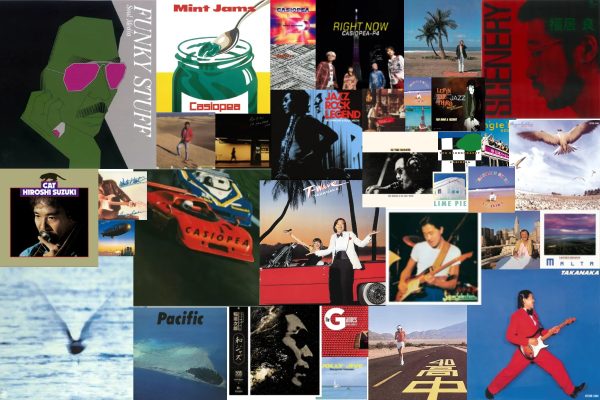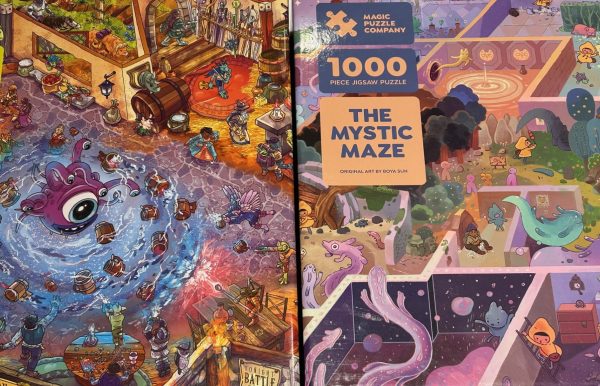Killing off Killing Eve: Killing Eve’s Final Season
Based on the “Killing Eve” novels by Luke Jennings, the BBC breakthrough show “Killing Eve” is coming to a timely end in its fourth and final season. The final season, and its three predecessors, have been a hot topic of discussion concerning its writing, or lack thereof. With fans and critics divided, some satisfied and most disappointed, there is no doubt “Killing Eve” has left a sizable influence on British and queer television.
Season one of “Killing Eve” is the absolute peak of the “dramedy” (drama and comedy) genre in screenwriting. It’s blunt, raw, awkward, and undoubtedly hilarious. Esteemed comedy screenwriter Phoebe Waller-Bridge is the heart and soul of “Killing Eve’s” first season, breathing life into the fire that co-stars Sandra Oh (Eve) and Jodie Comer (Villanelle) keep alight.
However, this flame has undoubtedly diminished as the writers change season to season. After only one season, Bridge left “Killing Eve” season two to screenwriter Emerald Finnel, then to Suzanne Heathcote, and finally to Netflix’s “Sex Ed” lead writer, Laura Neal (respectively). The introduction of a brand new writer each season causes different plots and tones to clash and fall flat. With each new season, the story strays farther and farther from the quintessential first. Now, at its final season, the once tense and tantalizing relationships between characters and storytelling overall have gone stale.
Coy MI5 agent, Eve, and the flamboyant professional assassin Villanelle’s personalities, motivations, and relationship have taken a complete 180 from season one. Despite outstanding acting performances from the entire cast, nothing can save the awkward, patch-work screenwriting of later seasons, especially for season four. I am not saying Neal is a bad writer… I’m saying she was thrust upon a mostly finished show in a genre she has never written for. She was pretty much set up for disaster in the first place.
As someone who has watched and loved “Sex Ed,” I know what she is capable of and what she’s good at and unfortunately, her writing just didn’t fit quite right for “Killing Eve.” Yes, it’s funny and blunt like Bridge’s is but it’s just not as witty and marinated as hers. The jokes in season one heavily relied on character and personalization, the punchline usually being a reaction to some sort of deadpan joke or comment, not just an obvious gimmick. Every single joke, no matter how stupid or immature, is seemingly fine-tuned to the character and situation. Because “Killing Eve” is such a character-sensitive show, you can’t waste jokes and plots like how Neal unfortunately does. In “Sex Ed,” there are a ton of meaningless yet hilarious jokes, which works for that genre. That humor, however, doesn’t fly in the tension-filled world of “Killing Eve.” For example: the whole Villanelle-drag-Jesus bit was cringe-worthy and messed with the tone of the show.
One of the biggest faults of “Killing Eve” is the difference in character dynamics. The first season did a thorough job of creating tension between Eve and Villanelle – the show’s purpose was for those two characters to eventually meet/interact.
But you can’t keep up the cat and mouse suspense for another three seasons, can you? Since season three, Villanelle has seemed like a sort of annoying ex Eve can’t quite shake, diminishing and decompressing the importance of their relationship. Comer and Oh were the only hope for this season and boy did they deliver. They absolutely acted their hearts out with the characters they know so well, even going to lengths to improvise and create their own scenes to better fit the characters from the detached writing.
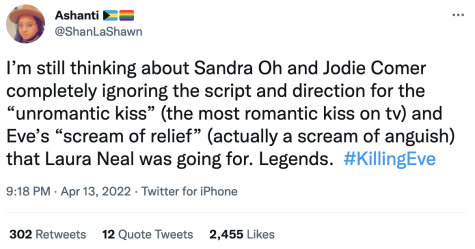
Additionally, “Killing Eve” switched from a specific character-based show to an ensemble-based show. It was a slow and awkward shift the writers had to make through seasons two to four because as mentioned previously, it was going to be hard to keep tension between Eve and Villanelle going for so long. Instead of doing the obvious and having them work together – as season two somewhat successfully did – seasons three and four opted to keep them apart, keeping the show tedious and predictable. It devastatingly left the show lacking in that quintessential tension between Eve and Villanelle. So with nowhere else to go, writers had to default on other, less developed, characters to pick up the slack such as Carolyn, Helene, and Konstantine. This left anyone vulnerable to messy storytelling that made this mess of a finale possible. The stumble to fix it resulted in painting “Killing Eve” into a more gimmicky, less complex, original show than it was originally.
Adding to the miss-matched plots and tones amongst screenwriters, Neal had a burning passion to resolve the whole “The Twelve” plot, which was originally a mere background for the relationship between Eve and Villanelle. But in season four, it seems the relationship is just a product of “The Twelve,” flipping the entire script of seasons one and two. It was random and inconsiderate to the characters and the first two seasons which revolved around the MI5 agent and assassin.
Sure, seeing Villanelle rip apart “The Twelve” single-handedly while Eve danced above deck was fun, but too juvenile and easy for a finale. This show is not about “The Twelve” nor Carolyn nor anything other than the budding and brutal yet captivating relationship between that of Eve and Villanelle. I would have loved to see an ending where Eve and Villanelle retire from hunting “The Twelve,” furthermore completing the theme of Eve and Villanelle’s relationship being the ultimate plot and focus of the show (much like the ending in the novels).
The banter in the camper van along with their breath-taking kiss filled my heart with love and relief… then was ripped out and stomped on. This finale has left me absolutely shattered. Because season four had only extreme lows and extreme highs, it felt like a slap in the face. Of course, the ending I’m talking about is Carolyn having Villanelle shot, ending the series indefinitely.
Alas, the show is “Killing Eve” and I won’t absolutely hate it (but I did hate the finale). I thought the character of Pam was solidly written and she was funny and compelling; I enjoyed how she was weaved in with the main cast. But most important to me, (almost) every scene between Eve and Villanelle was amazing thanks mostly to Comer’s and Oh’s outstanding performance and profound understanding of the characters. We finally see them domestically and lovingly interact with each other in the last episode and it was everything I could have wanted. Four whole years of tension have to lead up to these beautiful and heart-achingly wonderful scenes between the two unsuspecting lovers.
Yet, I am ultimately unsatisfied with the lack of Eve and Villanelle scenes considering how much history they have: Eve stabbing Villanelle, Villanelle shooting Eve, the kiss on the bus, the bridge scene, and the list goes on. For a show that’s about the two characters, they barely get any screen time together throughout all four seasons. Season four was perfectly set up from season three for Eve and Villanelle to spend most of season four together. But out of all the things that were changed in the series, the writers still kept them apart.
Now, I am not one to be mad at a tragic ending (a la Bly Manor) but it was sloppy and rushed. Why did Carolyn need to kill her and why is it so sudden? Conventionally, the idea of giving these characters such touching moments to just kill one of them is the bread and butter of tragedy writing, but it just didn’t click. It was extremely effective and disheartening, but for all the wrong reasons.
The utter slew of adorable Villanelle and Eve scenes really made that cheaply executed ending hurt. It was a lazy way to make a gut-punch ending, using it purely for shock value. This is an exhausting storytelling stereotype of “burying your gays,” a common trope in queer television where the promise of a loving queer relationship is dangled infront of the audience’s face, just to be snatched away with a character death.
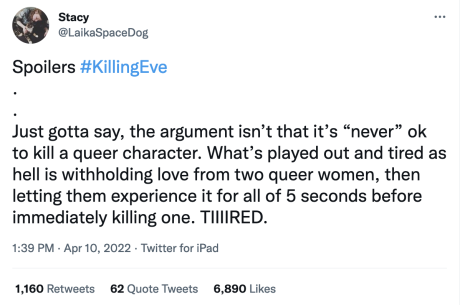
For such a complex and meaningful relationship, it was a shame the beautiful scenes between Eve and Villanelle were purely used as a simple plot device for a disastrous ending. It was insulting. It so clearly showed the lack of awareness the new writers had for the two characters but fans alike have been treasuring the special moment between characters as true and conclusive evidence of Eve and Villanelle’s raw love for each other.
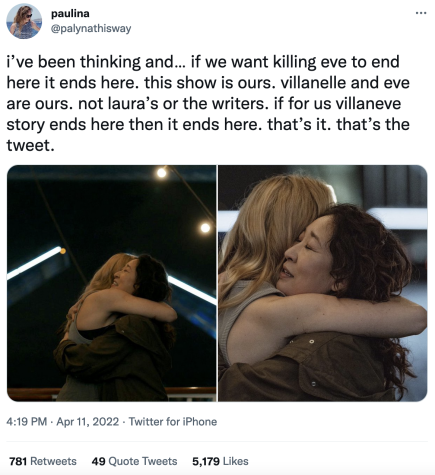
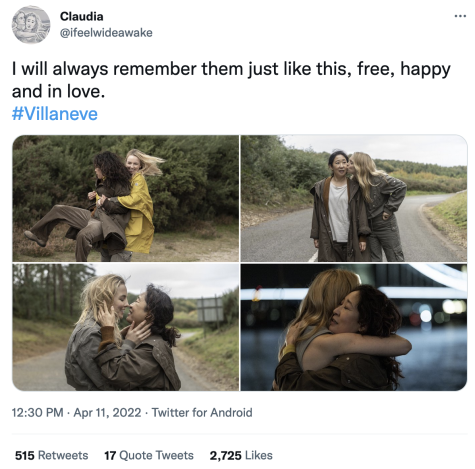
The first 20 minutes of the finale were boring and random, but those last 18 minutes were pure bliss before the two minute sequence of Villanelle’s death.
Ultimately I give “Killing Eve” Season four a generous 3/5 gunshot wounds. The season was rushed and tedious as well as removed from what made “Killing Eve” such a great show in the first place.
It is truly a disservice to fans and the show to sloppily end this extraordinary show and concept with a lazy, detached, and unsatisfactory ending. It is not fair to queer fans around the world and leaves an ugly scar on the history of queer characters in media.
Your donation will support the student journalists of Chamblee High School Blue & Gold. Your contribution will allow us to print editions of our work and cover our annual website hosting costs. Currently, we are working to fund a Halloween satire edition.

Lucy Samuels is a senior and has been working as a staff writer for two years. She sees herself in five years working for some sort of video game company. The show that represents high school to her is "Game of Thrones."

